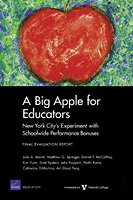 This report—a joint effort by RAND, Vanderbilt,
and the National Center on Performance Incentives—drove the final nail into the
coffin of New York City’s shaky
and pricey School-Wide Performance Bonus Program. We learn from this
analysis that Gotham’s foray into school-wide bonuses “did not improve student
achievement at any grade level.” In fact, average math and ELA scores for
participating elementary and middle schools were lower than those of the
control group. (There were no effects on scores at the high school level.) To
understand why, analysts queried participating teachers—ninety-two percent of
whom said the program didn’t affect the way they did their jobs. That shouldn’t
surprise anyone, since the bonuses amounted to only $1,500 after taxes, and
were tied to higher test scores school-wide—something over which individual
teachers have little control. Further, a third of teachers said they didn’t even
understand the criteria for obtaining the bonus. Thorough and informative, this
report should act as a warning bell for anyone looking to replicate Gotham’s
poorly designed (and now defunct) program.
This report—a joint effort by RAND, Vanderbilt,
and the National Center on Performance Incentives—drove the final nail into the
coffin of New York City’s shaky
and pricey School-Wide Performance Bonus Program. We learn from this
analysis that Gotham’s foray into school-wide bonuses “did not improve student
achievement at any grade level.” In fact, average math and ELA scores for
participating elementary and middle schools were lower than those of the
control group. (There were no effects on scores at the high school level.) To
understand why, analysts queried participating teachers—ninety-two percent of
whom said the program didn’t affect the way they did their jobs. That shouldn’t
surprise anyone, since the bonuses amounted to only $1,500 after taxes, and
were tied to higher test scores school-wide—something over which individual
teachers have little control. Further, a third of teachers said they didn’t even
understand the criteria for obtaining the bonus. Thorough and informative, this
report should act as a warning bell for anyone looking to replicate Gotham’s
poorly designed (and now defunct) program.
|
Julie A. Marsh, Matthew G. Springer, Daniel F. McCaffrey, Kun Yuan, Scott Epstein, Julia Koppich, Nidhi Kalra, Catherine DiMartino, and Art (Xiao) Peng, “A Big Apple for Educators: New York City’s Experiment with Schoolwide Performance Bonuses: Final Evaluation Report,” (Santa Monica, CA: RAND Corporation, 2011). |